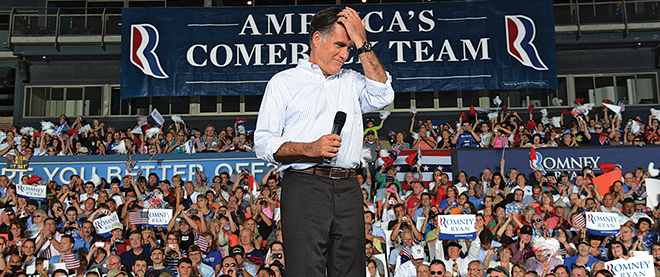Obama’s baby bump
The president’s post-convention jump in the polls has the Republicans flummoxed
Bill O’Leary/The Washington Post/Getty
Share

The U.S. conventions did what months of campaigning couldn’t: change the dynamics of the race. President Barack Obama got a much-needed bump in the polls, while Mitt Romney is now the official underdog, and nervous Republicans are calling for everything from the firing of his advisers to an economic road show.
And in a race that, for months, had been a dead heat, polls now show Obama emerging with as much as a six-point boost from the televised spectacle. His wife, Michelle, the popular first lady, gave a passionate speech laden with veiled slams at the Republican presidential nominee (“When you walk through that doorway of opportunity, you do not slam it shut behind you”). And former president Bill Clinton summoned his Rhodes Scholar-meets-hillbilly charm to make the case that Romney’s economic plans don’t pass basic country boy arithmetic (“I came from a place where people still thought two and two was four”). Obama’s speech underwhelmed, both in its run-of-the-mill delivery and its failure to lay out a substantive policy agenda matching the enormity of the fiscal challenges facing the U.S. (“Help me recruit 100,000 math and science teachers within 10 years”). But, apparently, it was enough.
It’s not that Republicans didn’t try. Romney’s wife, Ann, gave a personal pledge about her exceptionally successful husband (“This. Man. Will. Not. Fail”). The former secretary of state, Condoleezza Rice, inspired with a speech that linked broad policy themes to her rise from a childhood in segregated Alabama with rhetoric worthy of Obama in 2008 (“America has a way of making the impossible seem inevitable”). Vice-presidential candidate Paul Ryan’s speech sent fact-checkers into overdrive, but also delivered a stinging line on high youth unemployment (“College graduates should not have to live out their twenties in their childhood bedrooms, staring up at fading Obama posters”). But Romney’s economic-themed speech (“This President cannot tell us that you are better off today than when he took office”) was overshadowed by a surreal opening act in which actor Clint Eastwood rambled at an imaginary Obama in an empty chair (“What do you want me to tell Romney? I can’t tell him to do that. I can’t tell him to do that to himself]”). All the stage-managed ethnic diversity and heart-rending testimonials by Mormon parishioners whose lives were touched by Romney’s good works were eclipsed by the image of an angry, old white guy.
In the aftermath of the conventions, as poll after poll showed Obama leading, Team Romney rushed to reassure panicked supporters that convention “bumps” are fleeting. “Don’t get too worked up about the latest polling,” Romney pollster Neil Newhouse wrote in a memo. “While some voters will feel a bit of a sugar-high from the conventions, the basic structure of the race has not changed significantly. The reality of the Obama economy will reassert itself.” Indeed, the morning after Obama’s speech, fresh economic numbers showed that only 96,000 jobs were created in August—far short of the 125,000 that had been expected. The unemployment rate edged down to 8.1 per cent—but only because more Americans stopped looking for work, and were not counted in the statistic.
Indeed, some polls already show Obama’s post-convention bump fading. But Republicans now know that attacking Obama’s record is not enough. Romney’s path to the White House is further complicated by the electoral map: there are more solidly Democratic states than Republican ones, and Obama now has a slim lead in many of the key, so-called “swing” states Romney needs to win in order to amass the required number of electoral college votes.
Conservatives are also worried that Democrats drew fresh blood in Charlotte. All summer, the Obama campaign had used attack ads to keep Romney on the defensive over his business career at Bain Capital, but voters still trusted Romney on the economy. It took Clinton to highlight the “arithmetic” weakness of Romney’s economic plan: the former Massachusetts governor has not explained how he’d balance the budget while implementing his large tax cuts. Republicans are calling on Romney to get specific and to get aggressive.
“They’ve stereotyped [Romney] as a tax-dodging, outsourcing, 1950s aristocrat with a car elevator,” complained conservative talk show host Laura Ingraham on Monday, focusing her ire on Romney’s political consultants, calling on him to start fresh with new people. “He needs to hit the trail with a road show to explain how his policies will begin to turn things around.” Conservative commentator George Will was even more glum: “If the Republican party cannot win in this environment,” he said, “it has to get out of politics and find another business.”